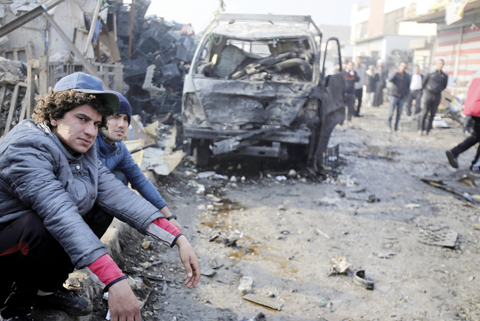'Series of attack kill more than 80 in a week'
 IRAQ: Citizens inspect the scene after a car bomb explosion at a crowded outdoor market in the Iraqi capital’s eastern district of Sadr City, Iraq, yesterday. —AP
IRAQ: Citizens inspect the scene after a car bomb explosion at a crowded outdoor market in the Iraqi capital’s eastern district of Sadr City, Iraq, yesterday. —APBAGHDAD: Suicide bombs at two marketplaces in Baghdad, one of them claimed by Islamic State, killed at least 20 people yesterday, police and medics said, the latest in a spate of militant attacks in the Iraqi capital that have left dozens dead. In the first blast, the attacker drove an explosives-rigged car into a large vegetable market in the mainly Shi'ite district of Jamila, and detonated it after security forces opened fire to try to stop the vehicle, police sources said.
A suicide bomber wearing an explosive vest blew himself up a few hours later at a market in the mostly Shi'ite Baladiyat district. The first blast killed 13, and the second blast killed seven people. More than 50 were wounded. Islamic State claimed carrying out the first attack in an online statement, saying the bomber had targeted "a gathering of Shi'ites" in Jamila. A series of attacks in Baghdad and other Iraqi cities have killed more than 80 people in just over a week.
Several have been claimed by the Sunni extremist Islamic State, which is coming under increasing pressure from a US-backed offensive in Mosul, its last major stronghold in Iraq. Iraqi forces advanced to within several hundred meters of the Tigris river than runs through Mosul on Saturday, as their operation against the militants gathers pace. Islamic State is likely to resort to bomb attacks and similar tactics elsewhere in Iraq as it is driven out of its Mosul stronghold.
Iraqi forces have pushed IS out of much of the territory it once held, but this bombing and the many others that have preceded it highlight the danger the jihadists can pose to civilians even as they lose ground. "A soldier at the gate of Jamila market opened fire on a suicide car bomb after noticing a suspect vehicle but the terrorist blew up his car," interior ministry spokesman Saad Maan said.
Operation recapture
A police colonel and a hospital official said at least 12 people were killed and 39 wounded. Maan said the soldier who opened fire on the attacker was among the wounded. Jamila is the main wholesale vegetable market in Baghdad and lies in Sadr City, a vast, mostly Shiite neighborhood in the northeast of the capital which has been repeatedly targeted. IS issued an online statement claiming the attack, using a nom de guerre indicating the bomber was Iraqi and saying that he targeted members of Iraq's Shiite Muslim majority, whom the jihadists consider heretics.
IS claimed an attack on January 2 -- also in Sadr City-when a suicide bomber blew up a vehicle packed with explosives among a crowd of day laborers waiting for work, killing 35 people. The jihadists overran large areas north and west of Baghdad in a swift 2014 offensive that swept through security forces unprepared for the assault. The number of bombings in the capital declined following the June 2014 offensive, apparently because the jihadists were occupied with holding territory they seized and later defending against Iraqi attacks.
Federal forces and units from Iraq's autonomous Kurdish region have since pushed IS back in a series of battles over a period of more than two years. On October 17, Iraqi forces launched a massive operation to recapture Mosul, now the country's last city in which IS holds significant ground. Iraqi forces punched into the city from the east, retook a series of neighborhoods, and are now approaching the Tigris River, which divides the city into its eastern and western sides. The western side, which is the smaller but more densely populated of the two, remains entirely under IS control.
Iraqi forces have also launched an operation to recapture IS-held towns near the Syrian border in Anbar province that along with Mosul and the northern town of Tal Afar are among the last populated areas under jihadist control. Iraqi Prime Minister Haider al-Abadi said in late December that three months were needed to eliminate IS in the country. But even if the jihadists no longer openly hold territory, they can still strike at Iraqi civilians and security forces using bombings and hit-and-run attacks.-Agencies










